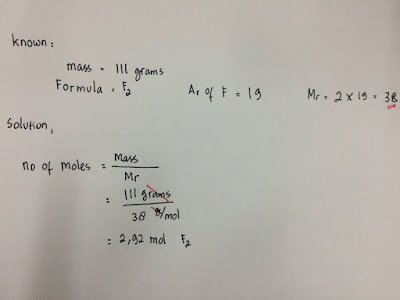According to dictionary of chemistry "Stoichiometry"
is the numerical relationship of elements and compounds as reactants and
products in chemical reactions. So in this article, I would like to present the basic concept of Stoichiometry.
A. Relative atomic mass (Ar)
The relative mass of an atom based on a scale in
which a specific carbon atom (carbon-12) is assigned a mass value of 12.
Example
A sample of gallium contains 60% of atoms of 69Ga
and 40% of atoms of 71Ga. Calculate the relative atomic mass of this
sample of gallium.
B. Relative formula mass (Mr)
Since atoms are so
tiny, we use large groups of atoms (moles of atoms) to east our calculation.
The formula for a compound contains much information of use to the chemist,
including the number of atoms of each element in a formula unit of a compound.
In this article I will
not use the term “Relative molecular
mass”. The word molecule or the
general term formula unit may applied
to one unit of H2O. The word atom
or the term formula unit may applied
to one unit of uncombined Pt. However, there is no special name for one unit of
NaCl. Formula unit is the best
designation. (Some texts refer to “molecule” of NaCl, and especially to
“molecular mass” of NaCl, because the calculations done on formula units do not
depend on the type of bonding involved. However, the terms molecule and
molecular mass should be reserved for substances bonded into molecules).
The
term “formula mass” is correctly used for either ionic or molecular
substances. Relative formula mass of a compound is the sum of the atomic
masses of all atoms in the formula.
Example
:
C. The mole
The
amount of substance that contains the mass in grams numerically equal to its formula mass in amu (atomic mass unit) contains 6.022 × 1023 formula
units, or one mole of the substance. This is sometimes called the molar
mass of the substance. Molar mass is numerically equal to the
formula mass of the substance (the atomic mass for atoms of elements) and has
the units grams/mole.







Finally! thank you so much this really helps. If you don't mind, would you post more about other different chemistry topics?
ReplyDeleteThanks for commenting,, I'll try my best,, don't forget to share :),,
Delete